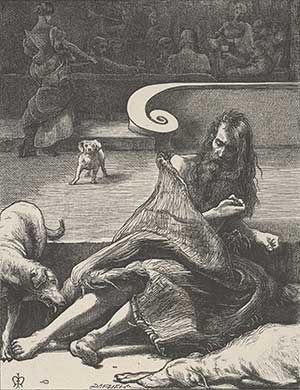 A member of the 20s-30s group at St. Peter Church and I have been involved in a Teen Lenten Program through video conferencing. The topic is Jesus’ saving questions.
A member of the 20s-30s group at St. Peter Church and I have been involved in a Teen Lenten Program through video conferencing. The topic is Jesus’ saving questions.
Although we don’t always grasp the meaning and purpose in scripture, Jesus often asks people questions, such as “What do you want?” and “Who do you say that I am?”
Recently, our group considered another of these questions: “What profit is there for one to gain the whole world and forfeit his life?” (Mk 8:36) That question summed up the readings and psalm from the Thursday of the Second Week of Lent. The key reading from Luke 16:19-31 is the Parable of the Rich Man and Lazarus. It raises the stark question: Can you gain just about everything that the world says is important, only to have nothing to show when you come before God at the end of your life?
 The rich man in the Gospel appears to have everything – a fine house, the best clothes, terrific food and fine wines, servants, and plenty of friends to dine with him. He has it made, except that when he dies he is the poorest person for he has no good deeds and no love to show God. The only one that he really loved was himself.
The rich man in the Gospel appears to have everything – a fine house, the best clothes, terrific food and fine wines, servants, and plenty of friends to dine with him. He has it made, except that when he dies he is the poorest person for he has no good deeds and no love to show God. The only one that he really loved was himself.
In a way, he was blind for he did not see the poor Lazarus, the person that he walked by on his way into his house each day. The rich man, whose name was probably embroidered on his fine linen, was so insignificant in God’s eyes that he has no name. As the prophet Jeremiah says to God, “He is like a barren bush in the wasteland ... a land, salty and uninhabited” (17:6). Or as the psalmist would say, “the way of the wicked leads to ruin.” (Ps 1:6). The rich man is lost – not because of what he did, but, as we say in the Confiteor, because of what he failed to do. He was more than able to help, but he did nothing.
Yet God hears the cry of the poor. God knows the poor Lazarus by name. Like many of the poor, he put his faith in God even though the world had abandoned him. Now Lazarus has found rest in heaven, where God “will wipe every tear from their eyes, and there shall be no more death or mourning, wailing or pain, (for) the old order has passed away” (Rev 21:4). He has found new life in heaven, resting in the bosom of Abraham. As the psalm response says, “Blessed are they who hope in the Lord.”
As we continue our Lenten journey, let us reflect on the question: “What does it profit a person to gain the whole world, only to lose oneself in the process?” May our prayer be: “Lord, help me to find myself and others in You.”
Jesuit Father John Michalowski is the parochial vicar of St. Peter Church in Charlotte.


